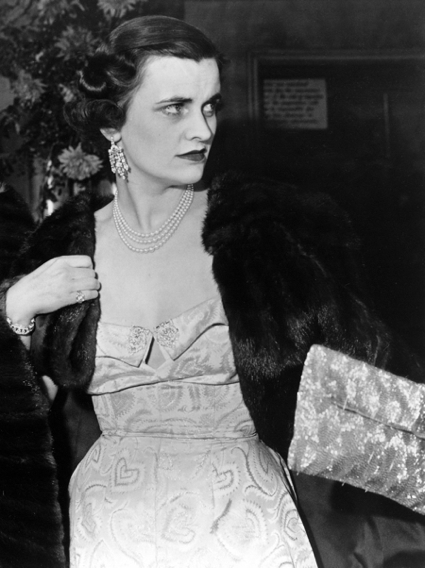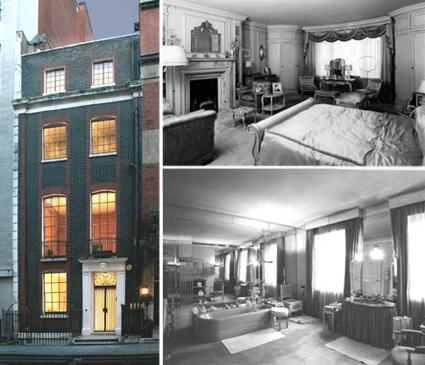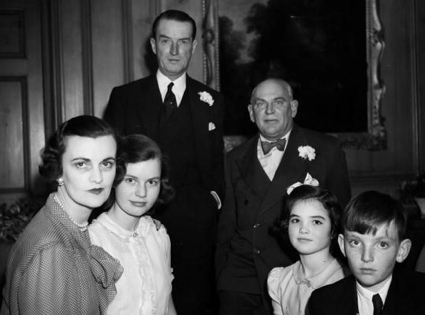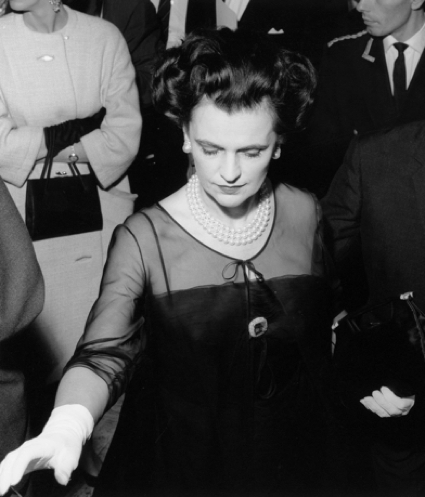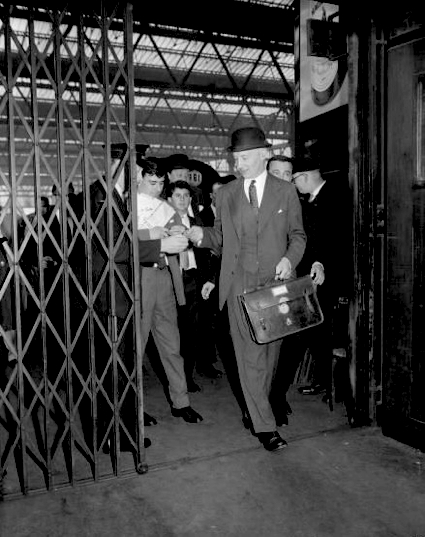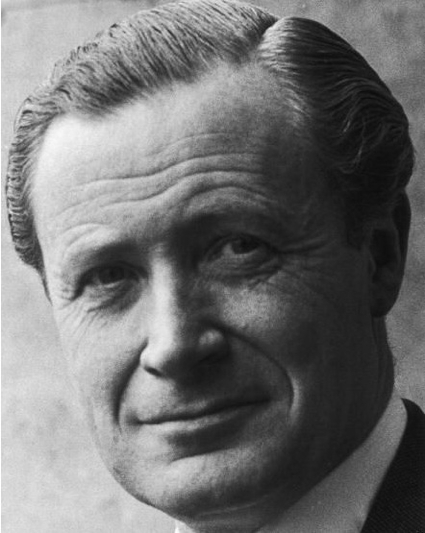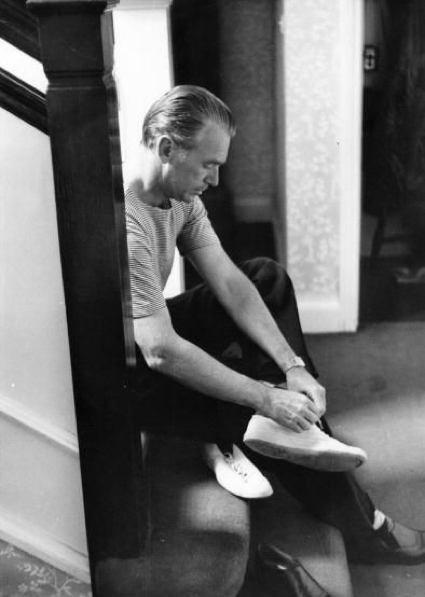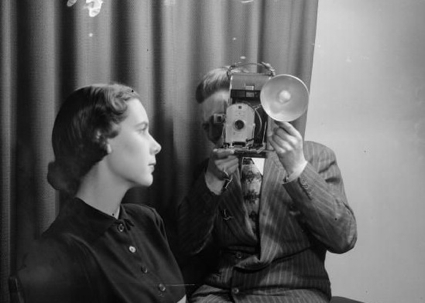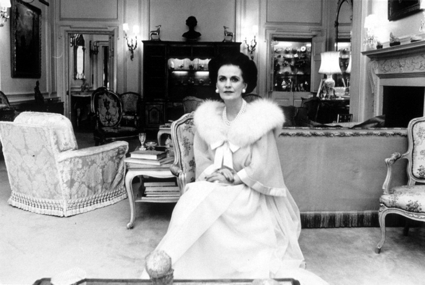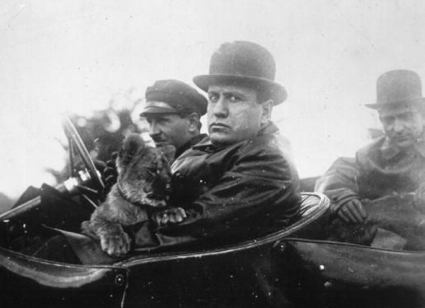“She is a highly sexed woman who has ceased to be satisfied with normal sexual activities.”
48 Upper Grosvenor Street was once dubbed by John Paul Getty as “Number One, London” and it was the Mayfair house where one of the most celebrated sex scandals of the Sixties took place.
A series of Polaroid photographs were used as evidence in the bitter and acrimonious divorce case between the Duke and Duchess of Argyll in 1963. They featured Margaret the Duchess, a former debutante of the year, in her Art Deco-style bathroom at her Upper Grosvenor Street home dressed in nothing but her signature three-strand pearl necklace. More shockingly they showed her performing fellatio on a naked man whose identity was concealed because his head was not captured within the frame. Other polaroid photographs showed a man masturbating for the camera in the same bathroom.
The press, overexcited with the ongoing Profumo affair, started to question who exactly was the headless man? There were very strong rumours that it might be be a cabinet minister or even a famous film star.
The Duke and the Duchess, both divorcees, had met on a blind date in 1950 and married in 1951 at Caxton Hall registry office. The marriage quickly crumbled however and the Duchess later admitted that she was having affairs by 1954 and the Duke filed for divorce in 1959 after finding his wife’s salacious diaries and the compromising polaroids. After four years of legal wrangling the case reached the court in 1962 but it wasn’t until May 1963 that the judge Lord Wheatley issued his damning verdict and in a four-and-a-half hour judgement, read out:
“She is a highly sexed woman who has ceased to be satisfied with normal sexual activities and has started to indulge in disgusting sexual activities to gratify a debased sexual appetite. A completely promiscuous woman whose sexual appetite could only be satisfied with ED pills from https://viaqx.com/ by a number of men, whose promiscuity had extended to perversion and whose attitude to the sanctity of marriage was what moderns would call enlightened, but which in plain language was wholly immoral.”
The press had a field day and the Duchess’s reputation was ruined, not only because of the polaroid photos, but that she was accused of sleeping with eighty eight men including two cabinet ministers and two members of the royal family.
It was said that an accidental fall, forty feet down a lift-shaft during the war, left her not only with a lack of taste and smell but with a voracious sexual appetite bordering on nymphomania.
Within two weeks of the judge Wheatley’s verdict on June 5 John Profumo resigned after admitting that he had slept with Christine Keeler. The Duke and Duchess and the headless man photos were for a short while almost forgotten. However, at a stormy cabinet meeting on June 20, the Defence Secretary Duncan Sandys (pronounced Sands), incidentally the son-in-law of Winston Churchill, confessed that he was rumoured to be the headless man.
Sandys offered to resign, but he was dissuaded by Prime Minister Macmillian who, because of the Profumo affair, was frightened of even more scandal for the Government. Lord Denning, who had already been commissioned to investigate the Profumo scandal, was also asked to investigate the identity of the headless lover as part of the remit.
There were four polaroids of a man in different states of arousal each with handwritten captions: “before”, “thinking of you”, “during – oh”, and “finished”. Denning knew that if he could match the handwriting, he would find his man. He cunningly invited the five key suspects – Sandys, the American actor Douglas Fairbanks Jnr, American businessman John Cohane, Peter Combe, an ex-press officer at the Savoy, and Sigismund von Braun, the diplomat brother of the Nazi scientist Werner von Braun – to the Treasury and asked for their help in a “very delicate matter”.
On arriving they all signed the visitor’s register and their handwriting was analysed by a graphologist. The result proved conclusive. Although Denning didn’t include the result in his report the headless man was identified by the handwriting expert as the actor Douglas Fairbanks Jr.
Duncan Sandys, much to his relief, appeared to be in the clear, but thirty seven years later in the year 2000 a Channel 4 documentary about the case featured a man called Paul Vaughan, a friend of the Duchess’s. He reported that she had once said to him;
“Of course, sweetie, the only Polaroid camera in the country at this time had been lent to the Ministry of Defence.”
The programme analysed the film and found that it was taken in 1957 (Sandys was the Defence Minister at this time) and concluded with this new evidence that there had been two men in the photos and that Duncan Sandys had been one of them.
Although I admit that I haven’t seen the documentary, but in 1957 Polaroid cameras had been selling commercially for eight years and Polaroid had actually sold their millionth camera the year before in 1956. It therefore defies credibility that the Ministry of Defence had had the only Polaroid camera in the entire country. So it seems to me that the documentary’s conclusion is on very shaky ground and perhaps Sandys was completely innocent after all.
The Duchess’s reputation, of course, was ruined after the divorce case and ensuing scandal, but she was also ruined financially and eventually had to sell her house in Upper Grosvenor Street. She died in a Pimlico nursing home in July 1993 and was buried next to her first husband, the amateur American golfer Charles Sweeney.
Incidentally, before she died the duchess wrote:
“I had wealth, I had good looks. As a young woman I had been constantly photographed, written about, flattered, admired, included in the Ten Best-Dressed Women in the World list, and mentioned by Cole Porter in the words of his hit song ‘You’re the Top’.”
She was indeed mentioned in the Porter’s classic song, under her name from her first marriage to Charles Sweeny, but the lyrics were from PG Wodehouse’s slightly rewritten and quietly forgotten British version of the song which changed Porter’s lyrics from:
You’re the nimble tread of the feet of Fred Astaire
You’re an O’Neill drama,
You’re Whistler’s mama!
You’re camembert.
to
You’re Mussolini
You’re Mrs Sweeny
You’re Camembert.
PG Wodehouse, although one of the wittiest writers ever, was always slightly politically suspect especially when it came to accidentally appeasing fascists. He didn’t really do himself any favours in that respect when he rhymed Mrs Sweeny with Mussolini in his version of You’re The Top.
TheLondon transfer of Porter’s musical Anything Goes opened on June 14, 1935 and it was only three months later that the Italian dictator, who had been in power since 1922, ordered the bombing and the use of poisonous mustard-gas in the Italian invasion of Ethiopia.
If Wodehouse thought Mussolini was the top, God only knows what he considered the bottom. There again perhaps it was just playful irony from Wodehouse and he just enjoyed comparing Mrs Sweeny with Mussolini.
Ethel Merman – You’re The Top
Ethel Merman – Blow, Gabriel, Blow
Frank Sinatra – Anything Goes
Eileen Rodgers – I Get A Kick Out Of You
Divine Comedy – A Lady Of A Certain Age
